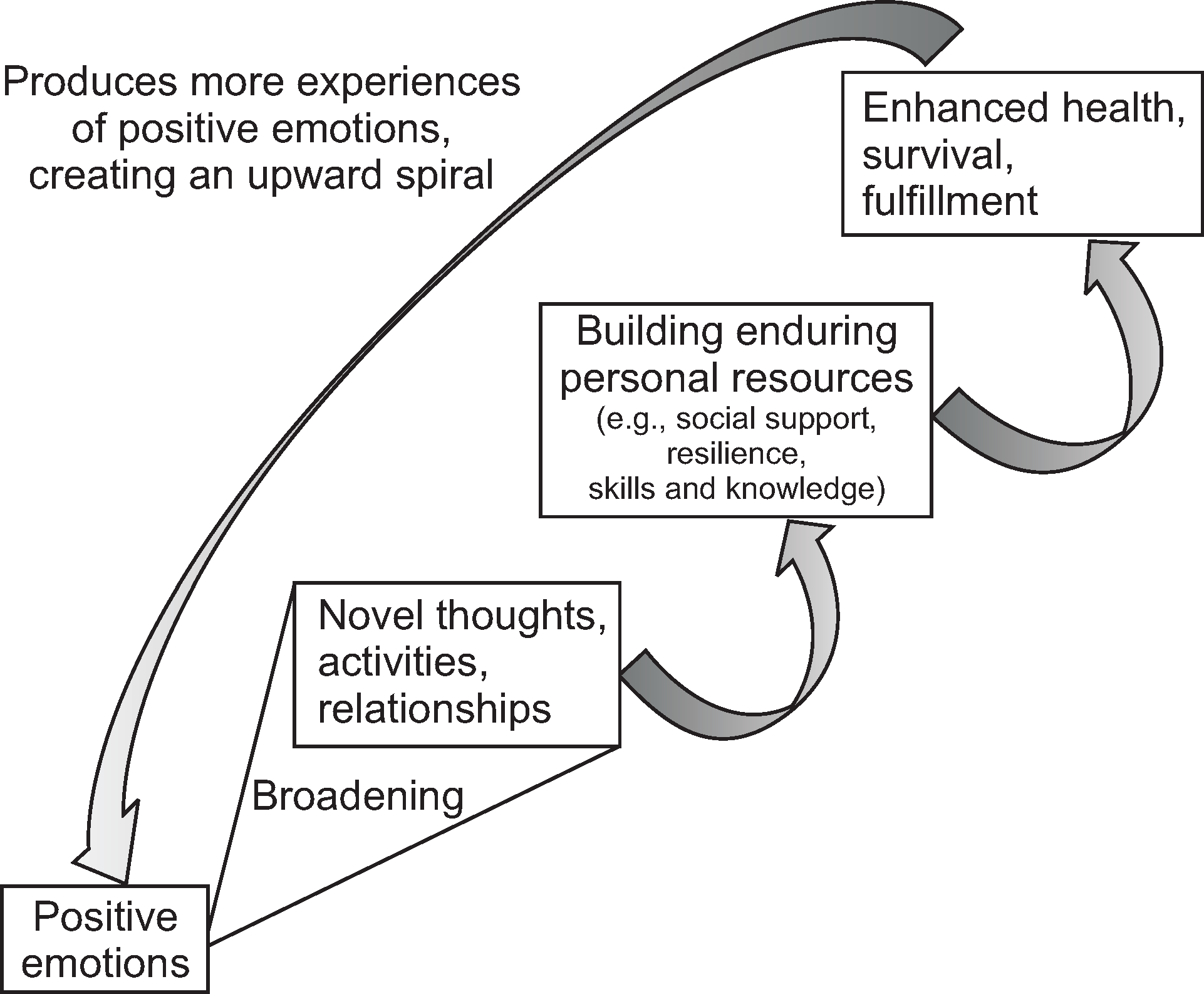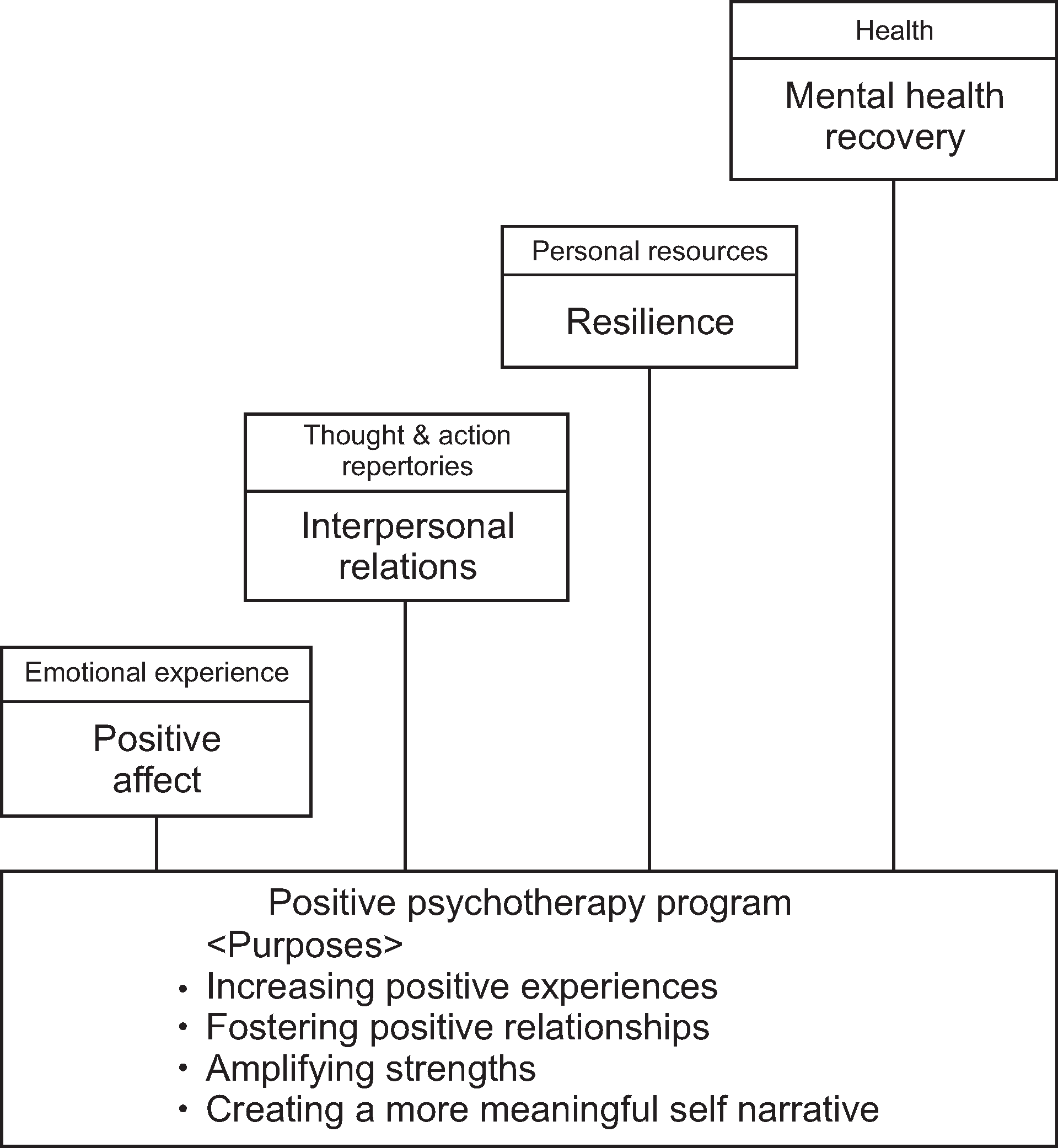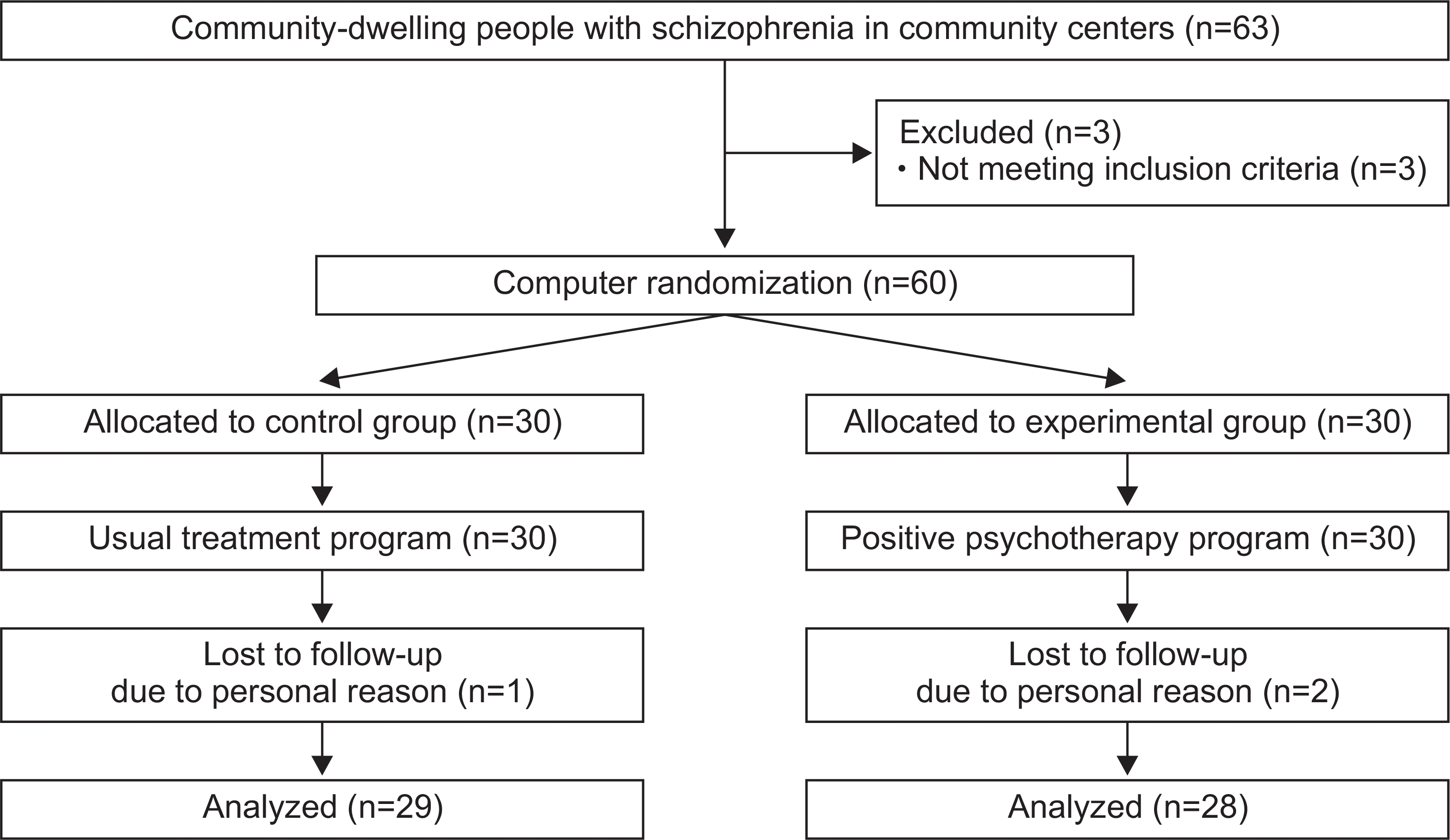Abstract
Purpose
Recently, the interest in positive psychotherapy is growing, which can help to encourage positive relationships and develop strengths of people. This study was conducted to investigate the effects of a positive psychotherapy program on positive affect, interpersonal relations, resilience, and mental health recovery in community-dwelling people with schizophrenia.
Methods
The research was conducted using a randomized control group pretest-posttest design. A total of 57 adults with schizophrenia participated in this study. The study participants in experimental group received a positive psychotherapy program (n=28) and the participants in control group received only the usual treatment in community centers (n=29). The positive psychotherapy program was provided for 5 weeks (of 10 sessions, held twice/week, for 60 minutes). The study outcomes included positive affect, interpersonal relations, resilience, and mental health recovery. The collected data were analyzed using repeated measures ANOVA for examining study hypothesis.
Results
Results showed that interpersonal relations (F=11.83, p=.001) and resilience (F=9.62, p=.003) significantly increased in the experimental group compared to the control group. Although experimental group showed a slight increase in positive affect, it was not significant.
Conclusion
The study findings confirm that the positive psychotherapy program is effective for improving interpersonal relations and resilience of community-dwelling people with schizophrenia. Based on the findings, we believe that the positive psychotherapy program would be acceptable and helpful to improve recovery of mental health in schizophrenia.
Go to : 
References
1. Schultz SH, North SW, Shields CG. Schizophrenia: A review. American Family Physician. 2007; 75(12):1821–1829.
2. Hong JP, Lee DW, Ham BJ, Lee SH, Sung SJ, Yoon T, et al. The survey of mental disorders in Korea 2016. Seoul: Ministry of Health and Welfare (Korea);2017. Apr. Report No.: 11-1352000-000564-13.
3. Yang S, Lee KS, Lee JS, Kwon HJ, Lee MH, Oh KO, et al. Psychiatric mental health nursing. 5th ed. Seoul: Hyunmoonsa;2016. p. 203–204. 219-222, 564-565.
4. Schön UK, Denhov A, Topor A. Social relationships as a decisive factor in recovering from severe mental illness. International Journal of Social Psychiatry. 2009; 55(4):336–347. https://doi.org/10.1177/0020764008093686.

5. Polk LV. Toward a middle-range theory of resilience. Advances in Nursing Science. 1997; 19(3):1–13. https://doi.org/10.1097/00012272-199703000-00002.

6. Bozikas VP, Parlapani E, Holeva V, Skemperi E, Bargiota SI, Kirla D, et al. Resilience in patients with recent diagnosis of a schizophrenia spectrum disorder. Journal of Nervous & Mental Disease. 2016; 204(8):578–584. https://doi.org/10.1097/NMD.0000000000000541.

7. Compton WC. An introduction to positive psychology. Belmont (CA): Thomson;2005. p. 1–276.
8. Bolier L, Haverman M, Westerhof GJ, Riper H, Smit F, Bohlmeijer E. Positive psychology interventions: A meta-analysis of randomized controlled studies. BMC Public Health. 2013; 13:119. https://doi.org/10.1186/1471-2458-13-119.

9. Park JI. A meta-analysis on the effect of positive psychology group program. Journal of the Korea Contents Association. 2015; 15(10):205–213. https://doi.org/10.5392/JKCA.2015.15.10.205.

10. Lee MH, Lee YS. The effects of happiness enhancement program based on character strength on subjective well-being, resilience, and interpersonal relation among high school students. The Korean Journal of Counseling and Psychotherapy. 2013; 25(4):813–831.
11. Lim YJ. Efficacy of positive psychotherapy on college students with major depressive disorder. Korean Journal of Clinical Psychology. 2012; 31(3):679–692. https://doi.org/10.15842/kjcp.2012.31.3.003.
12. Gander F, Proyer RT, Ruch W. Positive psychology interventions addressing pleasure, engagement, meaning, positive relationships, and accomplishment increase well-being and ameliorate depressive symptoms: A randomized, placebo-controlled online study. Frontiers in Psychology. 2016; 7:686. https://doi.org/10.3389/fpsyg.2016.00686.

13. Kim SH. Effects of positive group counseling on local child-center children's self-esteem, self-flexibility, and personal relationship [master’s thesis]. Gyeongsan: Youngnam University Graduate School;2013. p. 1–149.
14. Meyer PS, Johnson DP, Parks A, Iwanski C, Penn DL. Positive living: A pilot study of group positive psychotherapy for people with schizophrenia. The Journal of Positive Psychology. 2012; 7(3):239–248. https://doi.org/10.1080/17439760.2012.677467.

15. Kim KH. Effectiveness of a positive psychotherapy program for improvement of adjustment function in psychiatric inpatients [dissertation]. Seoul: Korea University Graduate School;2011. p. 1–126.
16. Schrank B, Brownell T, Jakaite Z, Larkin C, Pesola F, Riches S, et al. Evaluation of a positive psychotherapy group intervention for people with psychosis: Pilot randomised controlled trial. Epidemiology and Psychiatric Sciences. 2016; 25(3):235–246. https://doi.org/10.1017/S2045796015000141.

17. Fredrickson BL, Cohn MA. Positive emotions. Lewis M, Haviland-Jones JM, Barrett LF, editors. Handbook of Emotions. 3rd ed. New York: Guilford Press;2008. p. 777–796.
18. Waugh CE, Fredrickson BL. Nice to know you: Positive emotions, self-other overlap, and complex understanding in the formation of a new relationship. The Journal of Positive Psy- chology. 2006; 1(2):93–106. https://doi.org/10.1080/17439760500510569.

19. Gloria CT, Steinhardt MA. Relationships among positive emotions, coping, resilience and mental health. Stress & Health. 2016; 32(2):145–156. https://doi.org/10.1002/smi.2589.

20. Watson D, Clark LA, Tellegen A. Development and validation of brief measure of positive and negative affect: The PANAS scales. Journal of Personality and Social Psychology. 1988; 54(6):1063–1070. https://doi.org/10.1037/0022-3514.54.6.1063.
21. Lim YJ, Yu BH, Kim DK, Kim JH. The positive and negative affect schedule: Psychometric properties of the Korean version. Psychiatry Investigation. 2010; 7(3):163–169. https://doi.org/10.4306/pi.2010.7.3.163.

22. Guerney BG. Relationship enhancement: Skill-training programs for therapy, problem prevention, and enrichment. San Francisco (CA): Jossey-Bass Publishers;1977. p. 358–361.
23. Chun SK. A study on the effectiveness of social skills training program for rehabilitation of the schizophrenic patients [dissertation]. Seoul: Soongsil University at Seoul;1995. p. 1–178.
24. Connor KM, Davidson JR. Development of a new resilience scale: The Connor-Davidson Resilience Scale (CD-RISC). Depress Anxiety. 2003; 18(2):76–82. https://doi.org/10.1002/da.10113.

25. Baek HS, Lee KU, Joo EJ, Lee MY, Choi KS. Reliability and validity of the Korean version of the Connor-Davidson resilience scale. Psychiatry Investigation. 2010; 7(2):109–115. https://doi.org/10.4306/pi.2010.7.2.109.

26. Bullock WA. The mental health recovery measure. Campbell-Orde T, Garrett E, Leff S, editors. Measuring the Promise of Recovery: A Compendium of Recovery and Recovery Related Instruments. Part II. Cambridge (MA): The Evaluation Center @ HSRI;2005. p. 36–41.
27. Song GO. Validation of the Korean version of the mental health recovery measure. Mental Health & Social Work. 2010; 34(4):154–188.
28. Lee HJ. Meta-analysis on the effect of mental health programs for evidence-based social work practice: Focusing on people with mental disorder. Mental Health & Social Work. 2014; 42(1):171–200.
29. Brace N, Kemp R, Snelgar R. SPSS for psychologists: A guide to data analysis using SPSS for windows. 2nd Engl. Ed.Lee JI, translator. Seoul: Sigma Press;c2005. p. 218. p. 222-224.
30. Vass V, Morrison AP, Law H, Dudley J, Taylor P, Bennett KM, et al. How stigma impacts on people with psychosis: The mediating effect of self-esteem and hopelessness on subjective recovery and psychotic experiences. Psychiatry Research. 2015; 230(2):487–495. https://doi.org/10.1016/j.psychres.2015.09.042.

Go to : 
 | Figure 1.Model of the broaden-and-build theory of positive emotions Reprinted with permission of Guilford Press, Fredrickson and Cohn (2008, Figure 48.1) [17]. |
Table 1.
Positive Psychotherapy Program for Community-Dwelling People with Schizophrenia
Table 2.
Homogeneity Test for Subject’s General Characteristics and Study Variables (N=57)
Table 3.
Effects of Positive Psychotherapy Program on Positive Affect, Interpersonal Relations, Resilience, and Mental Health Recovery (N=57)




 PDF
PDF ePub
ePub Citation
Citation Print
Print




 XML Download
XML Download